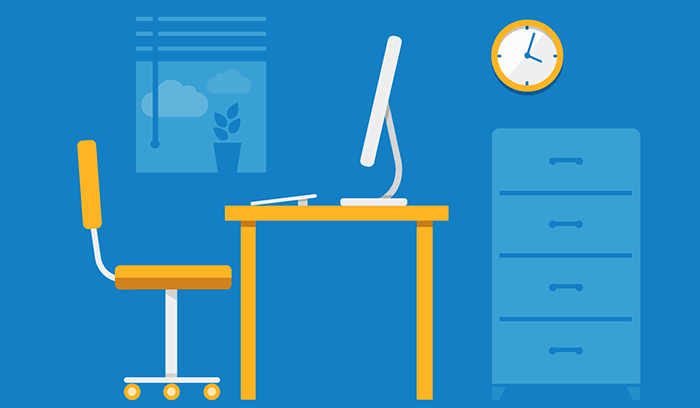Human resource management software helps small businesses manage core HR processes such as payroll and benefits administration, to name a few. The right combination of functionalities will depend on the business’s size, industry, and needs.
Smaller businesses often can’t afford to purchase a fully integrated HRIS that includes all use cases. That’s why we’ve gathered the best HRM software to help small businesses carry out core and strategic HR use cases.
In this article...
Top HR Solutions
We can also help you by curating a list of the best HR software for your small business. Click the image below to enter your feature needs, and our unbiased Technology Advisors will set you up with a list of HR software options that meet your requirements.
The Best HR Management Software for Small Businesses
Best for core HR: Namely
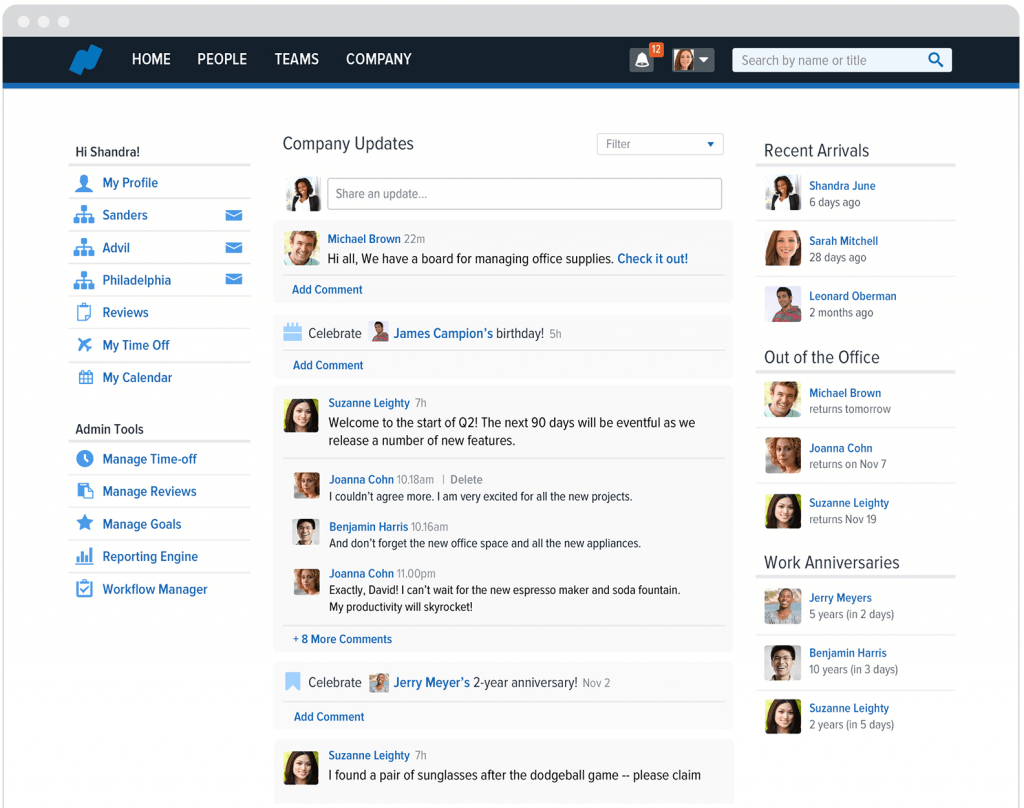
Manage time-off requests, workflows, performance management and more on Namely’s platform. Credit: Namely
Namely is a web-based platform specializing in core HR and talent management for growing companies. Their product covers payroll and benefits administration, time tracking, and performance reviews, and it serves as a system of record for all of your employee data. Namely also offers a built-in social news feed and custom reports for individual and team metrics.
The system is designed to be adaptable and user-friendly, which makes it stand out against more complicated enterprise solutions. But Namely’s penchant for small and growing companies doesn’t mean they skimp on resources: business clients receive 24/7 customer service through a dedicated Namely account manager.
While Namely has a ton of great features, it doesn’t offer an applicant tracking system (ATS), which can make recruiting more difficult. It also isn’t built for multinational businesses, but most smaller companies won’t need to worry about that.
Best for hiring: JazzHR
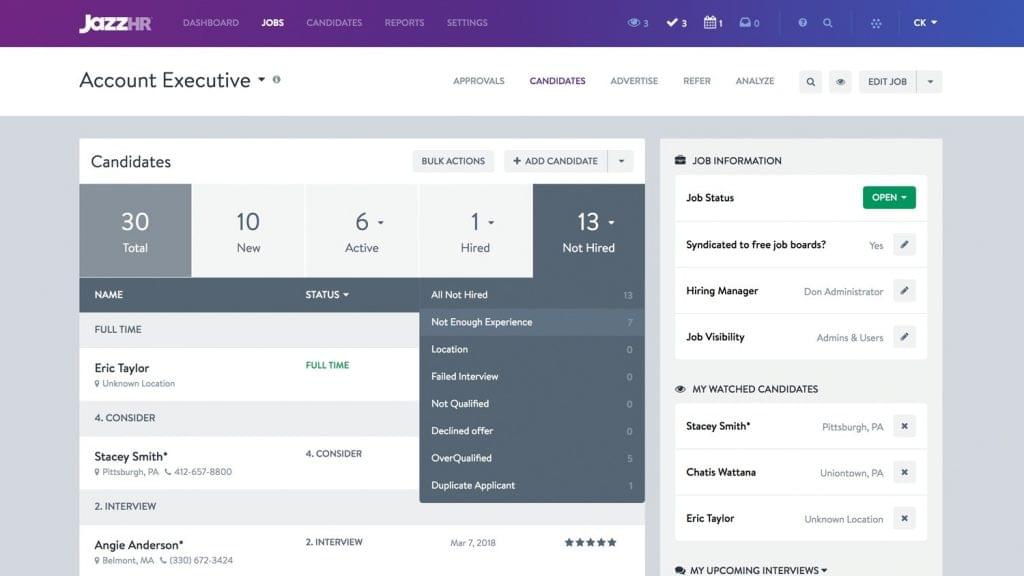
JazzHR enables easier hiring with advanced organization tools to evaluate candidates. Credit: JazzHR
JazzHR is an HR solution designed for applicant tracking and interview management. JazzHR helps companies post jobs, screen applications, and manage the interview process through a centralized, real-time platform.
Managers can create custom recruiting stages with automated to-dos (e.g. follow-up emails, reminders), and add stakeholders to the process as users with varying permissions and privacy levels.
Post directly to job search sites like Indeed, Glassdoor, and CareerBuilder, and use built-in SEO tools to make sure you have the right title and job description. JazzHR also offers social recruiting, employee referral programs, applicant screening, background checks, resume review, branded career sites, interview guides, and recruitment calendars.
Although it doesn’t have a native mobile app, career sites and interfaces are automatically optimized for the device in use. While JazzHR is great for recruiting new talent, it doesn’t offer much in the way of talent management. Once you find the right people, you’ll need a separate tool to manage them.
Best for employee self-service: BambooHR
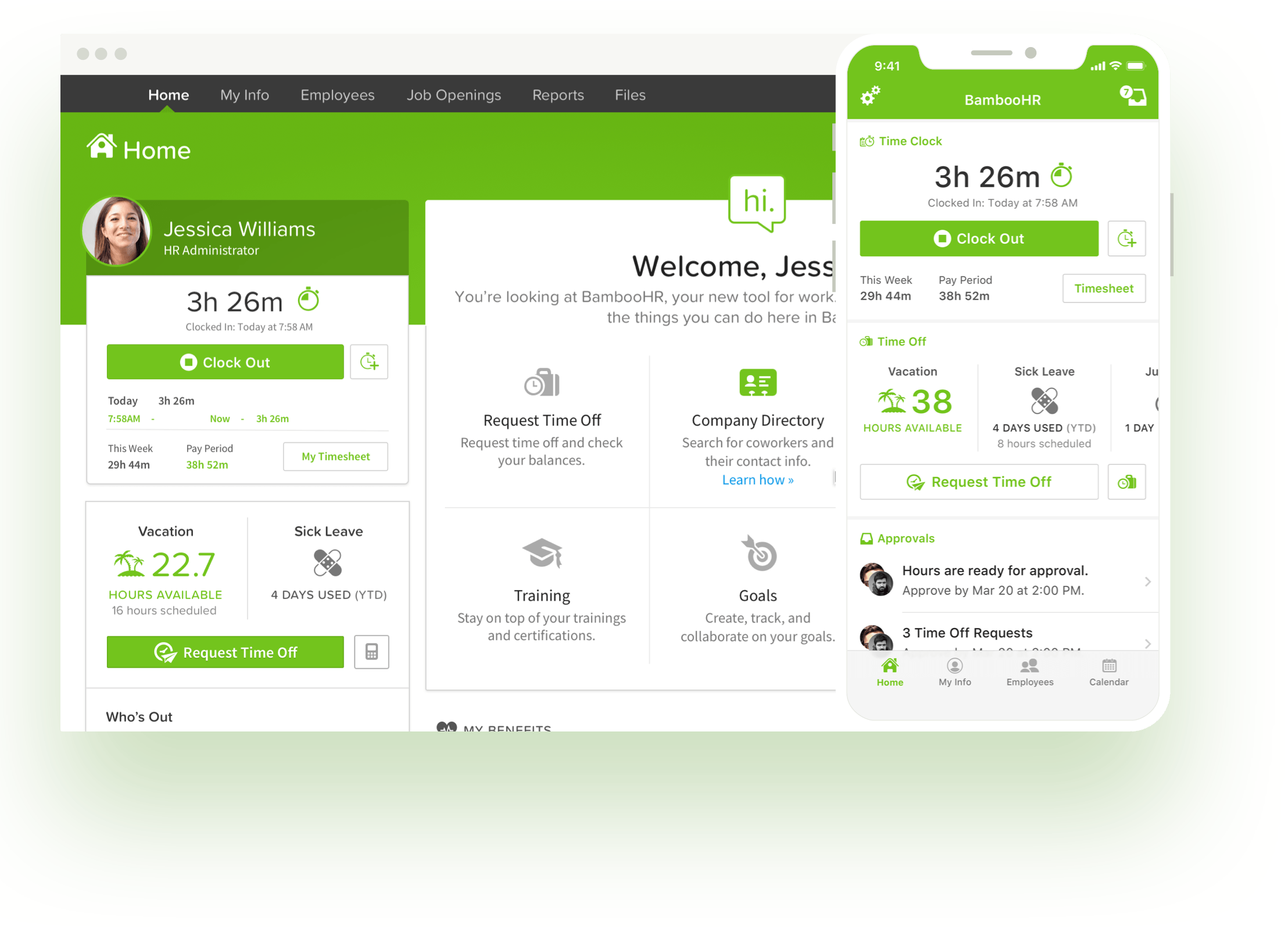
Bamboo HR empowers employees to own and manage their employee data, such as vacation time and overtime. Credit: BambooHR
BambooHR is a cloud-based core HR solution designed to meet small business administrative needs and give employees efficient self-service access.
The web application serves as a central repository of employee information, such as job and salary history, benefits, and training. Employees can access company documents, request time off, view, and edit their personal data all from a single dashboard.
With varying levels of custom access, administrators can manage time-off requests, set accrual policies, and generate custom reports based on any data in the system. For expanded use, BambooHR integrates with many popular applications for applicant tracking, eSignatures, payroll, and performance management. The system is also accessible on mobile devices through native apps for iOS and Android.
The recruiting aspect of BambooHR doesn’t include background checks, so you’ll need another way to handle those. Additionally, it doesn’t have any tools for goal management or employee recognition that could help keep your staff engaged and motivated.
Although BambooHR doesn’t offer some of the robust features of its competitors, the price point is hard to beat, and the user experience is simple.
Best for payroll: Gusto
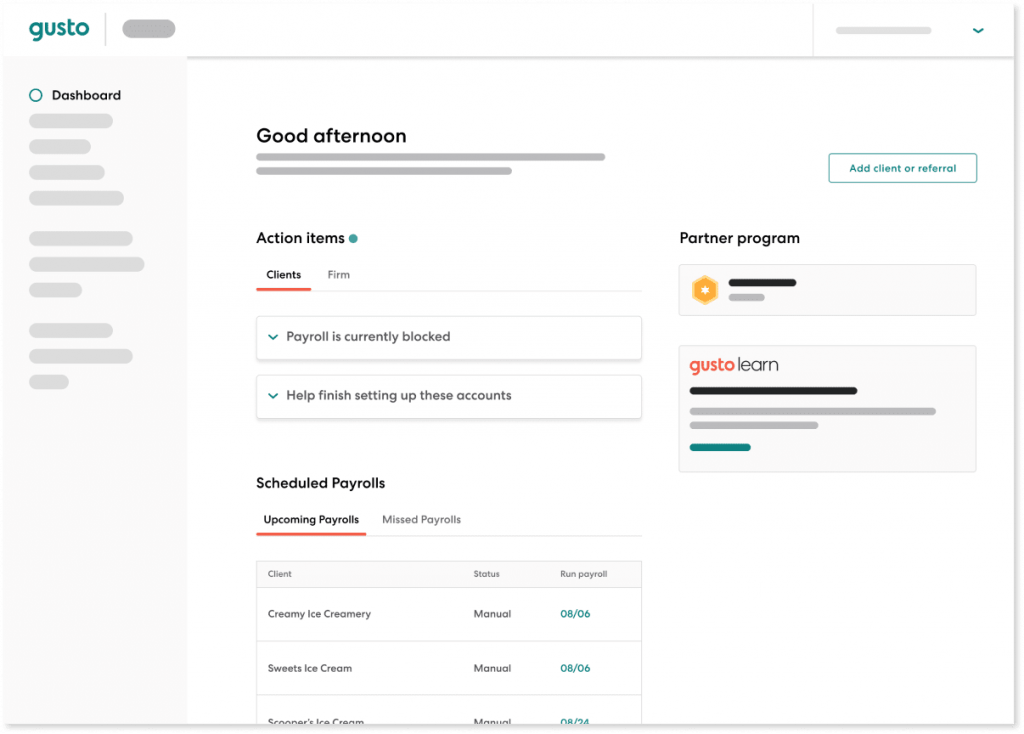
Gusto makes payroll management simpler with its automated features. Credit: Gusto
Gusto is a user-friendly HRM software solution that features payroll functionality and a variety of automated features to save HR teams valuable time.
Gusto’s payroll management tool automatically files payroll taxes at the local, state, and federal levels at the end of the fiscal year. This feature comes included while competitors charge an extra fee.
Gusto’s AutoPilot feature automates payments to employees to ensure they always get their paychecks on time. Employee forms like I-9s and W-2s are securely stored and organized in Gusto’s digital platform.
An added benefit for companies with a distributed remote workforce is Gusto’s compliance with the latest state tax laws. This ensures employers remain compliant in their payroll practices.
Best for benefit administration: TriNet Zenefits
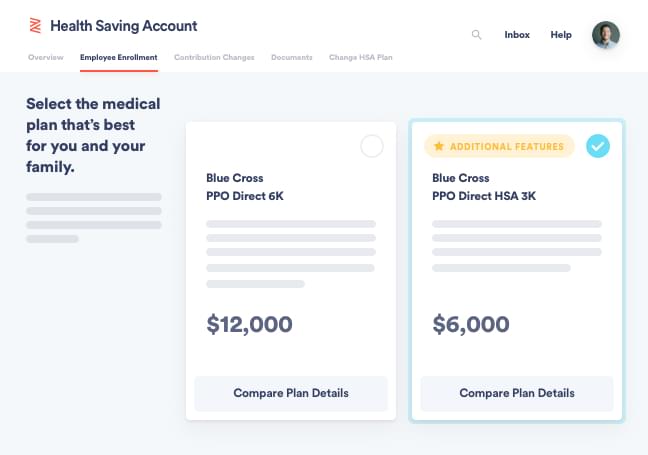
Employees can select and manage their benefits in the TriNet Zenefits platform. Credit: TriNet Zenefits
TriNet Zenefits—formerly called Zenefits—offers comprehensive HR software for hiring and employee data storage, but it also offers benefits administration at no additional charge. You just cover the health plan fees.
Benefits administration works for health insurance, life insurance, commuter benefits, as well as flexible spending accounts (FSA) and health savings (HSA) accounts. However, if you opt for your own third-party benefits broker—instead of Zenefits’ broker—this add-on incurs a small monthly fee.
You can extend your Zenefits plan with add-on payroll, advisory services, and recruiting at a low monthly or annual cost. Zenefits’ flexibility to add on later makes it a great option for small businesses that can’t commit to all the features now but plan to later as their financial resources allow.
Best for a deskless workforce: Connecteam

Easily contact employees through Connecteam’s employee directory. Credit: Connecteam
Connecteam is a mobile-first employee management tool that’s designed with communication in mind. Connecteam helps mobile-ready teams share information on the go by combining all of this and more in a single app:
- Time clocks
- Scheduling
- Forms
- Checklists
- Messaging
- Surveys, polls, and company reviews
Connecteam’s one-on-one chat and the ability to send an update to the entire team at once enables instant connection with individuals or the entire team.
Also, with a relatively small group of employees in a small business, Connecteam makes it easy to find a colleague in the directory and call them directly from the app—no fumbling for phone numbers and copying them over to the phone’s call app.
Why Do Small Businesses Need Human Resource Management Software?
Human resource management software helps HR teams at small businesses stay organized with hiring, training, and managing employees. Software solutions do this by providing a central interface to manage and even automate these different functions.
HRM software also serves as an employee self-service portal for some functions like benefits administration, for example. It empowers employees to make and act on decisions related to the conditions of their employment without necessarily needing to reach out to someone on the HR team.
Small businesses with tighter budgets and limited IT resources still face many nuanced challenges.
No dedicated HR staff
Many small businesses either assign HR responsibilities to a cross-functional manager or to a single, in-house HR administrator. In both scenarios, a single person handles payroll and benefits, time tracking, grievances and disciplinary action, hiring, and promotions, which can be overwhelming.
While HR software can’t replace an HR administrator, it can make it easier on the staff you do have. It simplifies and even automates certain HR processes, like sending new hire paperwork and benefits enrollment, your team can focus on the tasks that most need their expertise.
Record-keeping and regulatory compliance
HR regulations are constantly in a state of flux. And the growing popularity of remote work models has only made HR management more complex. Small businesses must balance healthcare reform, tax codes, and labor laws, often for more than one state. Failing to stay current and compliant with these policies is sure to result in mistakes, processing delays, and in worst cases, legal fees.
HR software organizes your records and makes them easily searchable and accessible. Many HR tools also automatically calculate tax and benefits withholdings to reduce the chances of human error and keep you compliant.
Employee attrition
According to a 2022 report from Pew Research, 22% of U.S. workers are considering a job change within the next six months. And a PwC Pulse Survey reports that 65% are actually in the process of looking for another job. Without a strategy for investing in talent and building an attractive work culture, small businesses lose good employees to competitors that offer higher salaries and better benefits.
The right HR software can actually lower operating costs, so you can afford to invest more in your people. Through automating and streamlining processes, HR software reduces the workload of your HR staff, meaning they’ll likely be less stressed as well.
Performance gaps
With smaller teams, it quickly becomes apparent if certain employees aren’t pulling their weight. But without a formal performance management or training system in place, it’s difficult to encourage consistent improvement among employees.
Many HR platforms feature performance management tools to standardize the review process and ensure that everyone’s meeting expectations. This can also improve metrics for bonus payouts to reward employees going above and beyond and motivate those that aren’t.
Given these pain points specific to small businesses, they need HR software that centralizes and streamlines workflows.
Types of HRM Software and the Tools that Small Businesses Need
HR software for small businesses falls roughly into three primary classes structured around use intent: core HR, strategic HR, and integrated HR suites.
Core HR
Core HR solutions help businesses perform the administrative functions of managing a workforce — payroll, benefits administration, time and attendance tracking, workforce planning, and regulatory compliance. The self-service portal — which lets employees access their work-related data and enter updates and requests — is also an integral feature for most core systems.
- Time tracking: Keep track of hourly employees’ time on and off the clock and time-off requests.
- Employee scheduling: Easily administer employee schedules and shift swaps.
- Payroll: Manage, maintain, and automate payments to employees.
- Benefits: Administer benefits to hires including health insurance, death benefits, retirement, and leave benefits.
Strategic HR
The primary focus of strategic HR solutions is to hire, retain, and develop the best employees, which is why it’s often referred to as “talent management.” These solutions mostly address recruitment, performance management, training and development, and succession planning. Some may even be best-of-breed applications designed to address a specific aspect of talent management, such as the hiring process.
- Hiring: Choose the employees who fit your needs, culture, and growth plans and build a candidate pool.
- Performance management: Track and improve employee performance through goal setting.
- Communication: Facilitate communication between employees and their managers in the form of messaging. Bonus points for tools that also include goal-based communication.
- Training: Train employees on job skills, career pathing, leadership, or company-specific knowledge.
- Rewards: Recognize and celebrate great behavior and improvements employees with bonuses, games, or let them choose how to spend their rewards.
Integrated HR suites
Integrated HR solutions provide end-to-end functionality across most or all areas of HR management. These include administrative aspects as well as recruitment, talent management, and e-learning (or learning management systems). Some product suites are sold in modules, which can be scaled up or down according to need.
Key features of comprehensive HR software include many components of core and strategic HR software plus:
- Applicant tracking and onboarding
- Compensation and succession planning
- Social recruiting
- Learning management
- Goal tracking
- Document management
- Reporting/analytics
How Do You Find the Right Human Resource Management Software?
Human resource management encompasses a set of employee-centered HR processes throughout the employee lifecycle—from hire to promotion to potential exit. It also includes tools to communicate with employees day to day.
HRM software comes in all shapes and sizes to fit the needs of your employees and your business. Because of their more limited budgets, small businesses should prioritize software features that address their most pressing needs.
Luckily, all of the options covered here offer optional tools to add on later. So no matter what software you choose, it will grow along with your company.
If none of the options listed here seem like a good fit for your organization, let our experts help you find the right solution using our Product Selection Tool. It only takes 5 minutes to get a list of employee management tools that fit your budget and needs.
